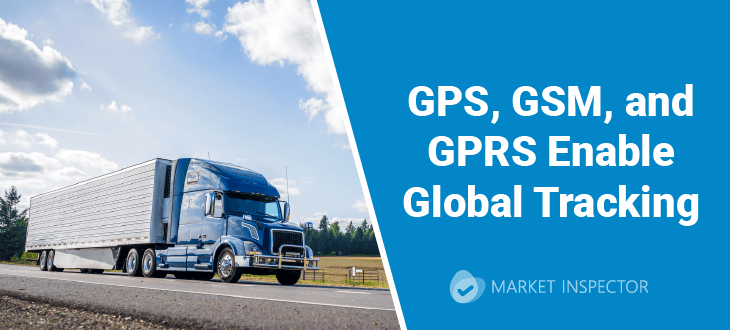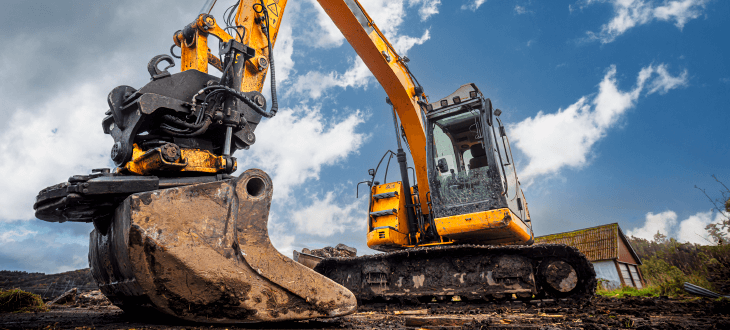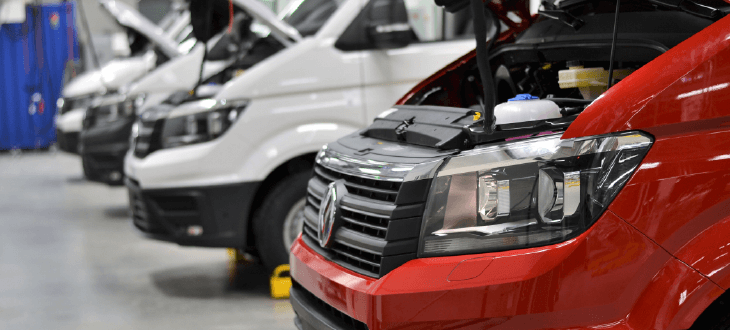Answer these simple questions and we will find you the BEST prices
Which type of solar quotes do you need?
It only takes 30 seconds
100% free with no obligation

Get up to 4 quotes from our selected suppliers by filling in only 1 form

Save money by comparing quotes and choosing the most competitive offer

Our service is 100% free and with no obligation
- Market-Inspector.co.uk
- Vehicle Tracking
- Construction equipment tracking
- Best Digger Tracker
What Is The Best Digger Tracker In 2024?


- Installing an equipment tracker on your machinery enhances security and operational efficiency, ensuring your valuable assets are protected and managed optimally.
- When selecting trackers for plant machinery, prioritise real-time tracking, geo-fence alerts, waterproof and durable design, mobile installation, and insurance approval (Thatcham-approved).
- Some trackers offer advanced features like geofencing, unauthorised movement alerts, and fuel level monitoring. Notable examples include SmarTrack Protector Pro Global and ScorpionTrack Reco S7.
Several options are available when selecting the best trackers for plant machinery. Battery-powered trackers like the Tracker Retrieve, and Metatrak Pulsar are easy to install and ideal for smaller equipment. Wired trackers like the ScorpionTrack HD S7-ALS and Metatrak S7 ATS connect directly to the machinery's electrical system for a more permanent solution.
Additionally, some advanced fleet trackers come with features like geofencing, unauthorised movement alerts, and fuel level monitoring. Notable options with these capabilities include the SmarTrack Protector Pro Global and ScorpionTrack Reco S7.
According to Verizon Connect’s e-book on Fleet and Asset Management Solutions: Construction Contractors and Heavy Equipment Companies, its fleet management platform offers comprehensive solutions tailored to the needs of construction contractors and heavy equipment companies. It provides an integrated fleet and asset management system, allowing users to view vehicle, equipment, and crew location data in one place.
Protect your valuable machinery with the best plant and machinery trackers available in the UK. Start comparing the top options today to find the perfect GPS tracking device for construction equipment that meets your needs and budget. Secure your equipment tracker now and ensure peace of mind for your business operations.
- Describe your needs
- Get free quotes
- Choose the best offer
It only takes 30 seconds

Best trackers for plant machinery in the UK
The right digger tracker is essential for securing diggers, mini-diggers, and excavators in the UK. Here’s a detailed look at some of the best tracking solutions available, their features, and the associated costs and benefits.
- TS10 Plant Machinery GPS Tracker: This tracker is easy to install, covert, and fully waterproof. It offers real-time tracking, geo-fence alerts, and mobile installation. It supports 12/24 volt machinery and provides comprehensive protection against theft. The tracker costs £54.00, after being reduced from £99.00.
- SmarTrack Maxi-Plant Tracker: This tracker provides 24/7 real-time tracking, unlimited history access, and push notification alerts. It includes a strong, waterproof magnetic case and is ideal for all plant machinery. It costs £199 with regular price discounts available.
- ScorpionTrack DRIVER S7 ALS GPS Tracker: Fully insurance-approved S7 Thatcham tracker with mobile installation. It includes European monitoring by a 24/7 control room and offers cost-effective subscription options. It is priced at £189.00, reduced from £249.00 .
- TrackStar S7 Tracker: It is fully insurance-approved, has mobile installation, and a completion certificate is issued after installation. It offers European 24/7 control room monitoring. It costs £219.
Key features
When selecting the best trackers for plant machinery, businesses should prioritise the following features:
- Real-time tracking: This is essential for knowing the exact location of your equipment at all times.
- Geo-fence alerts: Alerts you when the machinery leaves a designated area, providing an extra layer of security.
- Waterproof and durable design: Ensures the tracker can withstand harsh working conditions.
- Mobile installation: Convenient installation service at your location.
- Insurance approval: Look for Thatcham-approved trackers to potentially lower insurance premiums.
Costs and insurance benefits

Cheap tracking devices are an excellent option for businesses looking to enhance security and operational efficiency without incurring high costs. The costs of these tracking solutions vary but generally range from £54 to £249, with some advanced models costing more. Investing in a plant tracker protects your equipment and can lead to significant insurance benefits, such as reduced premiums and faster claims processing.
Kubota mini digger
Kubota is renowned for its robust and reliable construction machinery, making it one of the UK's most popular choices for mini diggers. The Kubota mini digger lineup is known for its impressive power, versatility, and advanced safety features, making them ideal for various construction tasks.
The brand is known for its innovative and reliable construction machinery. A key aspect of Kubota’s offering is integrating advanced tracking technology into its equipment, ensuring enhanced operational efficiency and security for businesses.
This focus on technology makes Kubota a preferred choice for industries that require precise and reliable machinery management solutions.
Kubota tracking solutions
Kubota offers advanced tracking solutions specifically designed for their machinery. The Kubota tracking system provides real-time location and performance data, enhancing fleet management and security.
- Real-time tracking: Monitor the exact location of your fleet anytime, anywhere, using any device.
- Enhanced security: Features like geofencing provide instant alerts if machinery moves out of designated areas.
- Increased productivity: Track operational performance, fuel consumption, and maintenance needs to minimise downtime and maximise efficiency.
Digger, mini digger and excavator: differences and plant tracking
Diggers, mini diggers, and excavators are essential equipment used in construction, landscaping, and various earthmoving tasks. Each type has specific functionalities based on size, power, and capabilities, and tracking these vehicles is crucial for efficiency, security, and maintenance.
Differences between machinery types
Digger
- Functionality: Diggers are typically larger and more powerful than mini diggers, and they are used for heavy-duty tasks such as large-scale excavation, trenching, and demolition.
- Tracking priorities: This area focuses on theft prevention, real-time location tracking, and operational efficiency. Monitoring fuel consumption and maintenance schedules is also critical due to their high value and usage in large projects.
Mini Digger
- Functionality: Mini diggers, also known as mini excavators, are compact and versatile. They are suitable for smaller sites, precise tasks, and confined spaces where larger machinery cannot operate.
- Tracking priorities: Emphasises geofencing to prevent theft and unauthorised use and real-time tracking to ensure efficient utilisation on job sites. Maintenance tracking is essential due to its frequent use in varied environments.
Excavator
- Functionality: Excavators are versatile machines for digging, material handling, demolition, and grading. They come in various sizes, from compact models to large industrial machines.
- Tracking priorities: This focus is on real-time tracking for operational efficiency, usage monitoring to manage productivity, and maintenance alerts to reduce downtime. Security tracking is also critical, given the high value of these machines.
Vehicle tracking solutions
We have listed some vehicle tracking solutions below.
- Real-time tracking: It provides instant location updates, ensuring machinery is where it should be. It also helps efficient fleet management and quick response in case of unauthorised movement. It is used across all machinery types to monitor and manage operations on-site and prevent theft.
- Geo-fencing sets virtual boundaries for machinery. Alerts are triggered if equipment moves out of designated areas. It is particularly useful for mini diggers and smaller excavators, which are often used in multiple small, confined sites.
- Maintenance monitoring: Tracks usage data to schedule timely maintenance, preventing breakdowns and extending the machinery's lifespan. It is essential for all types, particularly for diggers and excavators undergoing heavy use.
- Security features: Anti-theft features, including immobilisation and tamper alerts. These features are critical for all machinery, especially high-value diggers and excavators left on-site overnight.
Installing an equipment tracker

Installing an equipment tracker on diggers, mini diggers, and excavators ensures better security, operational efficiency, and maintenance management. Here’s a step-by-step guide to installing a tracking device, highlighting any differences between these machinery types.
Step-by-step installation process
- Select the right tracker: Based on your machinery type and requirements, choose a suitable digger tracker, mini digger tracker, or plant tracker.
- Prepare the equipment: Ensure the machinery where the tracker will be installed is clean and dry. Turn off the machinery and disconnect the battery for safety.
- Identify the installation location: For diggers, find a secure, hidden location like the engine compartment or under the cabin. For mini diggers, one should find discreet spots such as under the seat or within the control panel. Lastly, for excavators, place it in accessible yet hidden areas like the engine bay or behind the dashboard.
- Mount the tracker: Use adhesive or screws to secure the tracker. For magnetic trackers, attach them to a metal surface.
- Connect the power supply: Connect to the machinery’s electrical system for hard-wired trackers. Use a stable power source like the battery or fuse box for diggers and excavators. For mini diggers, find an accessible power point. Lastly, for battery-powered trackers, ensure the battery is fully charged.
- Activate the tracker: Follow the manufacturer's instructions to activate the tracker, usually involving an app or web portal.
Differences in installation
Installing an equipment tracker effectively on your machinery enhances security and operational efficiency, ensuring your valuable assets are protected and managed optimally.
- Power source connection: The main difference lies in the connection to the power source. Diggers and excavators often have more accessible and stable power points, while mini diggers may require more careful planning due to their compact size.
- Placement: Given their size, mini diggers may have fewer hiding spots for the tracker, necessitating more creativity to ensure the device is secure and discreet.
- Tracker type: Hard-wired trackers are common for larger machinery like diggers and excavators due to their reliability. Battery-powered trackers might be more practical for mini diggers due to easier installation and space constraints.
Plant trackers: theft recovery and anti-tamper
Diggers, mini diggers, and excavators are at high risk of being stolen or tampered with due to their high value and the ease with which they can be resold or stripped for parts. These types of machinery are often left unattended on remote job sites, making them prime targets for theft.
According to the NFU Mutual Rural Crime Report 2023, the cost of rural crime in the UK has risen significantly, with machinery theft being a significant contributor. In 2022, the cost of stolen machinery was £49.5 million, with certain regions like the Midlands seeing a 30.1% increase in theft.
Importance of trackers
Given the high incidence of theft, the presence of plant and machinery trackers is crucial. Tracker devices not only help in recovering stolen equipment but also act as a deterrent against theft and tampering. Here’s why trackers are essential for different types of machinery:
- Diggers: Real-time tracking and geo-fencing are critical due to their high value and frequent use in large-scale construction projects. These features help monitor the machinery's location and usage, prevent unauthorised use, and aid in quick recovery if stolen.
- Mini diggers: These are often used in smaller, confined spaces and are easier targets for theft. Trackers with tamper alerts and compact designs ensure they can be hidden while providing robust security features like real-time location updates and unauthorised movement alerts.
- Excavators: Because of their high operational value, excavators benefit from advanced tracking features such as real-time performance monitoring, maintenance alerts, and geofencing. These features help prevent theft and maintain the machinery’s operational efficiency.
Trackers for plant machinery: fleet management
Implementing vehicle tracking for plant machinery like diggers, mini diggers, and excavators offers significant benefits for fleet management efficiency.
Advantages of vehicle tracking
- Real-time monitoring: Provides exact location and operational control, ensuring optimal use and reducing idle times.
- Improved security: Geo-fencing and tamper alerts help prevent theft and unauthorised use.
- Enhanced maintenance: Schedules timely maintenance based on usage data, preventing breakdowns.
- Cost savings: Reduces fuel consumption and downtime through efficient fleet use.
Laws and regulations for heavy equipment GPS tracking
UK businesses must comply with several laws and regulations when installing GPS tracking devices on heavy equipment like diggers. These ensure the privacy and rights of employees are protected while allowing employers to manage their assets effectively.
Key UK laws and regulations
Data Protection Act 2018 (DPA)
This act governs the processing of personal data in the UK and aligns with the General Data Protection Regulation (GDPR). Employers must ensure that any personal data collected through GPS tracking is processed lawfully, fairly, and transparently. For instance, if a business installs a tracker on a digger, it must inform the operator (employee) about the tracking and how the data will be used.
For example, a construction company installs a GPS tracker on a digger without informing the operator. This could result in a breach of the DPA, as the employee's location data is personal data that should be handled with transparency.
General Data Protection Regulation (GDPR)
GDPR is a comprehensive regulation that enhances data protection for individuals within the EU, which the UK continues to follow post-Brexit. Companies must obtain explicit employee consent before collecting and processing their location data. They must also ensure data security and provide access rights to the data subjects.
For example, a manager decides to track a digger's location to monitor productivity but fails to get the operator’s consent. This non-compliance with GDPR could lead to significant fines and legal action.
Employment Practices Code (Information Commissioner's Office)
This code provides guidance on handling employee data, including monitoring and surveillance in the workplace. Employers must conduct a privacy impact assessment before implementing tracking systems. They should also communicate clearly with employees about the purpose of the tracking, the data collected, and how it will be used.
For example, before installing trackers on their fleet of diggers, a construction firm conducts an impact assessment and informs all operators about the new system, ensuring transparency and compliance with the Employment Practices Code.
Practical application in business
Let’s look at a scenario where installing a GPS tracker on a digger takes place.
- Inform and obtain consent: The employer must inform the digger operator about the GPS tracker installation, explain its purpose, and obtain explicit consent.
- Conduct a privacy impact assessment: Assess the potential impact on the operator’s privacy and document measures to mitigate any risks.
- Limit data collection: Ensure that data collection is limited to working hours and related to business operations.
- Secure data: Implement strong security measures to protect the collected data from unauthorised access.
- Provide transparency: Allow the operator to access their data and understand its use.
By adhering to these regulations, businesses can effectively manage their fleet of diggers while ensuring compliance with UK laws and protecting their employees’ rights.
Compare multiple quotes
As a business owner, comparing multiple quotes for digger trackers can save time and money. By evaluating various options, you ensure you get the best investment value. Here are some benefits of comparing multiple quotes:
- Cost savings: Different providers offer varying prices for similar features. By comparing quotes, you can find the most cost-effective solution.
- Better features: Not all trackers offer the same functionalities. Comparing quotes helps you identify which options provide the best features for your needs.
- Improved service: Different companies offer different levels of customer service and support. You can select a provider known for excellent service by reviewing multiple options.
- Negotiation power: Multiple quotes leverage you to negotiate better terms and prices with your preferred provider.
- Informed decision: Comparing quotes allows you to make an informed decision based on a comprehensive understanding of what's available in the market.
Start comparing quotes today to find the best digger tracker for your business in 2024. Your effort will pay off in better features, improved service, and substantial savings. Don't settle for the first option - explore your choices and make a wise investment!
- Describe your needs
- Get free quotes
- Choose the best offer
It only takes 30 seconds

FAQ
Yes, heavy equipment often comes equipped with tracking devices. These devices monitor the machinery’s location, usage, and performance. They help prevent theft, schedule maintenance, and improve operational efficiency.
A GPS logger records an asset’s position at regular intervals and stores this data internally. It is used primarily for post-event analysis. On the other hand, a GPS tracker provides real-time location information and can send this data to a remote server or device, allowing for live tracking and monitoring.
To track your equipment, you can use various types of tracking devices, such as battery-powered trackers for smaller equipment, wired trackers that connect to the machinery’s electrical system for a more permanent solution, and advanced trackers that offer features like geofencing, unauthorised movement alerts, and fuel level monitoring.
Yes, a mechanic can usually find a GPS tracker if they are specifically looking for it. Most trackers are installed in accessible parts of the machinery for maintenance purposes, and a skilled mechanic can identify and locate these devices during an inspection.

Nicole Bea Kerr is a content writer for Market Inspector, leveraging her experience in B2B journalism and editing. She is interested in bringing more awareness to sustainability and helping businesses make informed choices through insightful narratives.
We strive to connect our customers with the right product and supplier. Would you like to be part of Market Inspector?

- What Is The Best Digger Tracker In 2024?
- Best trackers for plant machinery in the UK
- Digger, mini digger and excavator: differences and plant tracking
- Plant trackers: theft recovery and anti-tamper
- Trackers for plant machinery: fleet management
- Laws and regulations for heavy equipment GPS tracking
- Compare multiple quotes
- FAQ
